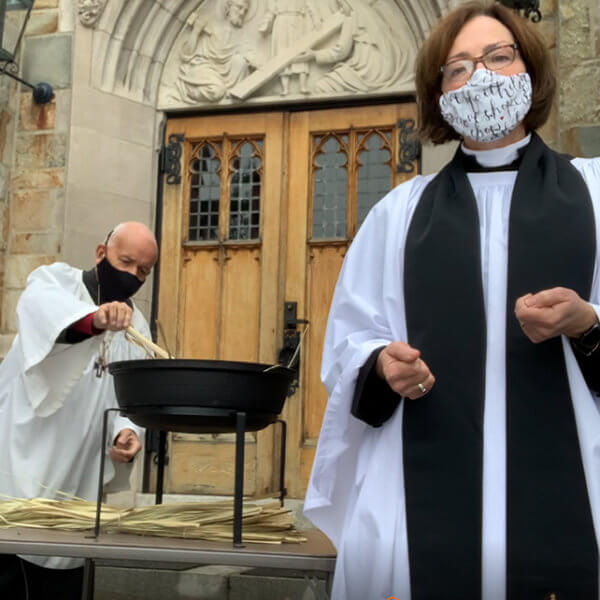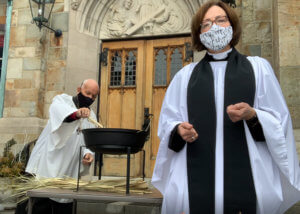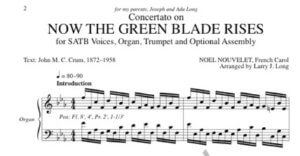
Ashes for Growth
God of resurrection and life, you bring forth the first green of spring from the cold damp earth just as you brought forth Jesus from the darkness of the tomb. Help us to see your coming kingdom even as we walk in it now, always yearning toward new life in your glory yet to come. Amen
 Sunday after church, Bobby and I burned the palms from last Palm Sunday in the churchyard to make the ash we’ll use today. Now, I’ve been an Episcopalian all my life, and I grew up in the minority in a community of Roman Catholics, so I’m used to these questions: What are you giving up for Lent? What will be your Lenten fast? I’ve heard — and probably asked — these questions many, many times over the course of my life. And — maybe like you — I’ve “given things up” for Lent. I’ve fasted from chocolate, coffee, sweets, and wine. And I wonder whether this was really what Jesus was up to during his 40 days and nights in the wilderness.
Sunday after church, Bobby and I burned the palms from last Palm Sunday in the churchyard to make the ash we’ll use today. Now, I’ve been an Episcopalian all my life, and I grew up in the minority in a community of Roman Catholics, so I’m used to these questions: What are you giving up for Lent? What will be your Lenten fast? I’ve heard — and probably asked — these questions many, many times over the course of my life. And — maybe like you — I’ve “given things up” for Lent. I’ve fasted from chocolate, coffee, sweets, and wine. And I wonder whether this was really what Jesus was up to during his 40 days and nights in the wilderness.
I wonder if I have grown in discipleship from these disciplines over the Lents of my lifetime, and I wonder if there is a different way to think about it. Remember that John the Baptist preached repentance, which in the original Greek of the New Testament would have been the word metanoite — which means a change in the way you see things.
Repentence
The Latin translation of metanoite is repentance. There are many associated words in English — penalty, punishment, punitive, penal system — and so the use of the word repentance in John the Baptist’s cry in our English translation of the gospels gets all tied up in those associated words. We start to think of repentance as punishment — self-denial, abstinence, and even suffering. We think of repentance as stopping doing bad things rather than seeing and experiencing the world and our relationships in a new way. And sometimes it seems that we need to suffer — or to give things up — for that punishment.
 Was Jesus suffering in the wilderness those 40 days and nights? Maybe. Scripture tells us that he was tempted — he wrestled with hard ideas like earthly power, ego, control over his future, obedience to the life he was choosing. But did he give up chocolate — or more likely in his Ancient Near East context, dates, olive oil, or wine? I’m not sure that was the focal point of Jesus’ experience in the wilderness, even though the gospels said that he fasted. Jesus was working during that time. Jesus was preparing himself for his own earthly ministry in the wilderness, and Lent is the time we prepare for our own earthly ministry — what comes next for us after Easter.
Was Jesus suffering in the wilderness those 40 days and nights? Maybe. Scripture tells us that he was tempted — he wrestled with hard ideas like earthly power, ego, control over his future, obedience to the life he was choosing. But did he give up chocolate — or more likely in his Ancient Near East context, dates, olive oil, or wine? I’m not sure that was the focal point of Jesus’ experience in the wilderness, even though the gospels said that he fasted. Jesus was working during that time. Jesus was preparing himself for his own earthly ministry in the wilderness, and Lent is the time we prepare for our own earthly ministry — what comes next for us after Easter.
Ancient Christians prepared for their baptism during Lent. Catechumens, as these adults who wanted to become Christians were called, read scripture, and learned about the doctrines of the church, to get ready for what it would mean to live in Christian community, and to see the world and their relationships in a new way. After this Lenten period of preparation, they were baptized at Easter.
Focus and Prepare
So how do we use Lent as a time to focus and prepare for our earthly ministry, like Jesus and ancient Christians did? Do we do this by “giving up” chocolate or coffee? Maybe. But not because chocolate or coffee are innately bad or sinful, or because they are pleasures we need to put aside while we “suffer” like Jesus did. That would be the punitive sense of repentance, instead of the perspective-shifting sense that we get from the original Greek metanoiete.
We don’t need to give up desserts or sweets or wine because they are bad or because God doesn’t want us to enjoy ourselves — but we could give up anything that gets in the way of who we want to be as Christians. We can give up things — or adopt disciplines — that help us focus on our commitment to live as disciples of Jesus, and to prepare for the earthly ministry we want to engage. And Jesus tells us how to fast in our reading today — not by suffering and disfiguring our faces so that other people can tell we’ve given up chocolate, or wine, or cake, but by focusing our attention on God, because God knows who our best selves are and will help us get there if we pay attention, and remove any distractions from our environment.
 When I think of Lent, I think of one of my favorite Easter hymns, Now the Green Blade Riseth, written by John McCleod Campbell Crum in England in 1926 while Crum was a canon at Canterbury Cathedral in England. The imagery of Jesus’ resurrection in the hymn is drawn directly from John 12:23, here in the King James translation Crum used:
When I think of Lent, I think of one of my favorite Easter hymns, Now the Green Blade Riseth, written by John McCleod Campbell Crum in England in 1926 while Crum was a canon at Canterbury Cathedral in England. The imagery of Jesus’ resurrection in the hymn is drawn directly from John 12:23, here in the King James translation Crum used:
And Jesus answered them, saying, the hour is come, that the Son of man should be glorified.
Verily, verily, I say unto you, except a corn of wheat fall into the ground and die, it abideth alone: but if it die, it bringeth forth much fruit.
What does a grain of wheat lying in the cold, dark ground do? It doesn’t hibernate. It’s not dormant. It’s not denying itself the nutrients it needs to become wheat. Instead, it is nourishing itself. It is preparing for its next stage. It is taking on water and nutrients from the soil, and sprouting and greening in its seed sheath:
Now the green blade riseth, from the buried grain
Wheat that in dark earth many days has lain;
Love lives again, that with the dead has been:
Love is come again like wheat that springeth green.
Lent itself is a season of preparation. We remember Jesus’ preparation, and prepare for our own earthly ministry, by focusing on where Jesus is present in our lives during Lent. We mark the beginning of Lent — this time of preparation for our earthly ministry — with the mark of the cross on our foreheads in ashes, which have long used as natural fertilizer for plant growth. We wear a cross of ashes on our foreheads to remember God’s presence with us, nourishing and guiding us. Amen
